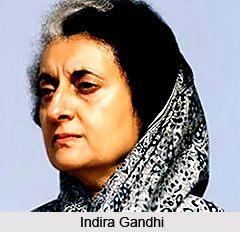 Indian politics under Indira Gandhi is an important chapter in the political history of India. The entire period between Nehru`s death in 1964 and the consolidation of power in the country under Mrs. Gandhi`s leadership in 1971-72 constituted a extended succession crisis and struggle for power, with the period of Lal Bahadur Shastri`s prime minister ship from May, 1964 to January, 1966 but a brief interregnum between Nehru and Mrs. Gandhi, the two dominant leaders of India since Independence. The period is marked by five critical steps in the rise of Mrs. Gandhi and the defeat of all her prospective rivals.
Indian politics under Indira Gandhi is an important chapter in the political history of India. The entire period between Nehru`s death in 1964 and the consolidation of power in the country under Mrs. Gandhi`s leadership in 1971-72 constituted a extended succession crisis and struggle for power, with the period of Lal Bahadur Shastri`s prime minister ship from May, 1964 to January, 1966 but a brief interregnum between Nehru and Mrs. Gandhi, the two dominant leaders of India since Independence. The period is marked by five critical steps in the rise of Mrs. Gandhi and the defeat of all her prospective rivals.
The first step of Indira Gandhi was her own succession to power in 1966 after the sudden death of Lal Bahadur Shastri. In the year1967, defeat of Morarji Desai in the Congress Parliamentary Party (CPP) was the second significant step in Mrs. Gandhi`s consolidation of power, which established her pre- eminence against her only serious competitor, despite severe losses suffered by the Congress in the 1967 elections under her leadership. The Congress split of 1969 over the Congress nominee for the presidency of India was the third critical point in Mrs. Gandhi`s consolidation of power. Mrs. Gandhi won the battle for the presidency with the election of her candidate, V. V. Giri, against the official Congress nominee, Sanjiva Reddy. However, in the process, she was expelled from the Congress and lost control over the party organisation since Mrs. Gandhi`s potency was more in the CPP than in the state party organisations.
Indira Gandhi decided to call national parliamentary elections in March, 1971. The people of India were, in effect, asked to settle the struggle for power that had been going on since Nehru`s death, to choose between Mrs. Gandhi and her opponents, between the old Congress and the new. The results of the 1971 elections were an awe inspiring victory for Mrs. Gandhi whose Congress (R) won a two thirds majority in the Lok Sabha. Mrs. Gandhi was then indisputably the most excellent leader of the country. With this triumph behind her, the Congress (R) and Mrs. Gandhi were able to go to the polls in the March, 1972 legislative assembly elections with confidence and gain large majorities in all the major states in the Indian Union. The first succession crisis in post Independence India had been with certainty ended in favour of Mrs. Gandhi, who at that time occupied a position of centrality and supremacy in the Indian political system that appeared to equal or even go beyond that of her father.
Mrs. Indira Gandhi established a unique strategy of ruler ship between 1972 and 1975 that was greatly personalised and centralised and that involved unprecedented assertions of executive power in the Indian political system. Her centralising actions also transformed the character of center-state governmental relations in the states controlled by the Congress. Mrs. Gandhi set out to remove every Congress chief minister who had an independent base and to substitute each of them with chief ministers personally dependable to her and without an independent base. Emergency in 1975 was an important political event during her governance. It brought about great chaos and confusion all over the country. In the face of these simmering discontents, Mrs. Gandhi suddenly announced in December, 1977 a call for new parliamentary elections and a relaxation of the Emergency. In the election, the Janata government came into power and normalcy was in due course restored.




















